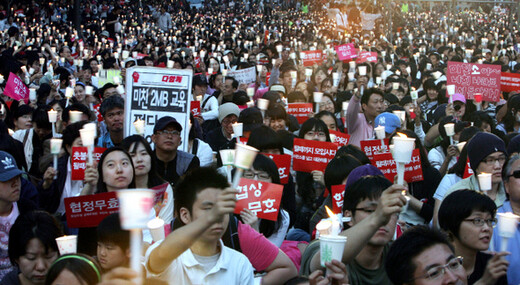hankyoreh
Links to other country sites 다른 나라 사이트 링크
Remarks made during S. Korea-U.S. beef negotiations raise questions

Public anger over the South Korean government’s decision to resume imports of U.S. beef is running sky-high after the Korean government was found to have made a series of grave errors in its negotiations with the United States. With the public describing the negotiations as “humiliating” and being like a “mad rush,” most people believe the beef negotiations were settled as a “gift” given to the United States in exchange for President Lee Myung-bak’s U.S. visit last month. Until now, there has been no tangible evidence to prove that this was anything more than speculation. But if we thoroughly retrace the remarks made by the negotiators at the time, we can get a glimpse into why the talks ended unexpectedly and how the outcome was affected by a set of “invisible hands.”
The biggest issue is that the beef negotiations were concluded abruptly, with no breakthrough in the final stage. The talks began at 10:00 a.m. on April 11 and ended at 5:00 a.m. on April 18. If remarks made at the time by Assistant Agriculture Minister Min Dong-seok, Seoul’s chief negotiator to the beef talks and the other negotiator, at press briefings and outside the negotiating site are analyzed, the two sides were far divided. In looking at other processes of negotiation, it is easy to conclude that it would have been impossible for the two sides to have reached an agreement as was done on April 18. At the time, many journalists expected the talks would be settled ahead of the summit between President Lee and U.S. President George W. Bush, but nobody anticipated the extent of the concessions made by South Korea.
On the first day of talks on April 11, Min said, “The U.S. is making a request for us to lift restrictions on all ages and parts (of cattle used for meat to be imported under the agreement).” On the second day of talks on April 14, Min said, “We have maintained our stance that it’s impossible for us to import without restrictions on all ages and parts.” In particular, South Korea asked the United States to agree to an additional list of banned parts, in addition to a list of specified risk materials thought to cause mad cow disease, Min said at the time.
As the talks extended to April 17, a grim-faced Min said, “The two sides remain far divided and the gap is too deep.” The mood was shaky as Min indicated that the talks could collapse, saying, “We will continue the talks if there is the possibility for a deal. But if not, we will halt the talks.” That remark was made at around 6:00 p.m. on April 17.
At 1:00 a.m. on April 18, when most journalists covering the talks had left the negotiating venue, the progress in the negotiations was unknown. However, negotiations were settled at around 5:00 a.m. on April 18, and the outcome revealed that South Korea had given up nearly all of its demands. Given the remarks made by Min leading up to the settlement of the deal, it is not difficult to imagine that a “political decision” was made between 6:00 p.m. on April 17 and 5:00 a.m. on April 18, which led to a breakthrough in negotiations and resolution of the beef agreement.
Please direct questions or comments to [englishhani@hani.co.kr]
Editorial・opinion
![[Editorial] Does Yoon think the Korean public is wrong? [Editorial] Does Yoon think the Korean public is wrong?](https://flexible.img.hani.co.kr/flexible/normal/500/300/imgdb/original/2024/0417/8517133419684774.jpg) [Editorial] Does Yoon think the Korean public is wrong?
[Editorial] Does Yoon think the Korean public is wrong?![[Editorial] As it bolsters its alliance with US, Japan must be accountable for past [Editorial] As it bolsters its alliance with US, Japan must be accountable for past](https://flexible.img.hani.co.kr/flexible/normal/500/300/imgdb/original/2024/0417/6817133413968321.jpg) [Editorial] As it bolsters its alliance with US, Japan must be accountable for past
[Editorial] As it bolsters its alliance with US, Japan must be accountable for past- [Guest essay] Amending the Constitution is Yoon’s key to leaving office in public’s good graces
- [Editorial] 10 years on, lessons of Sewol tragedy must never be forgotten
- [Column] A death blow to Korea’s prosecutor politics
- [Correspondent’s column] The US and the end of Japanese pacifism
- [Guest essay] How Korea turned its trainee doctors into monsters
- [Guest essay] As someone who helped forge Seoul-Moscow ties, their status today troubles me
- [Editorial] Koreans sent a loud and clear message to Yoon
- [Column] In Korea’s midterm elections, it’s time for accountability
Most viewed articles
- 1‘Right direction’: After judgment day from voters, Yoon shrugs off calls for change
- 2[Editorial] Does Yoon think the Korean public is wrong?
- 3Where Sewol sank 10 years ago, a sea of tears as parents mourn lost children
- 4[Editorial] As it bolsters its alliance with US, Japan must be accountable for past
- 5Strong dollar isn’t all that’s pushing won exchange rate into to 1,400 range
- 6[Guest essay] Amending the Constitution is Yoon’s key to leaving office in public’s good graces
- 7Japan officially says compensation of Korean forced laborers isn’t its responsibility
- 8US, Japan and China move to become self-sufficient in semiconductors
- 9In 50 years, half of Koreans are expected to be 65 or older
- 10[News analysis] Watershed augmentation of US-Japan alliance to put Korea’s diplomacy to the test